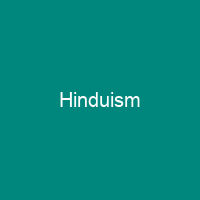Hinduism: The Enigma Wrapped in an Umbrella
Hinduism is an umbrella-term for Indian religious and spiritual traditions unified by dharma and rituals. It encompasses diverse systems of thought, including theology, mythology, and scriptures such as the Vedas, Upanishads, and Puranas. Imagine Hinduism as a vast forest with many trees—each tree representing a different tradition or belief system, all interconnected under one overarching canopy. This canopy is dharma, which guides the way of life for millions across India and beyond.
The Roots of an Enigma
Hindu beliefs include karma, saṃsāra, and the four Puruṣārthas—duties that shape one’s path through life. Practices such as devotion, worship, sacrificial rites, meditation, and yoga are woven into daily life. But there is no central authority; instead, four major denominations exist: Shaivism, Shaktism, Smartism, and Vaishnavism.
These denominations differ primarily in the central deity worshipped, traditions, and soteriological outlook. For instance, Vaishnavism, with about 641 million adherents, worships Vishnu and his avatars, particularly Krishna and Rama. Shaivism focuses on Shiva, attracting individuals to ascetic individualism and nondualistic beliefs.
From Vedic Times to Modernity
The term “Hinduism” was first used in 1816-17 by Raja Ram Mohan Roy to describe a collection of Indian practices and beliefs. Initially, the term referred to the followers of Indian religions collectively as Hindus.
Hinduism cannot be defined as a religion according to traditional Western conceptions due to its diversity of beliefs and traditions. The term defies categorization, and it has been referred to as a way of life or dharma. Scholars regard Hinduism as a fusion of Brahmanical orthopraxy with various Indian cultures, with diverse roots and no specific founder.
Divine Diversity
Hinduism includes various ideas on spirituality and traditions, encompassing polytheistic, pantheistic, and monotheistic perspectives. The six āstika schools of Hindu philosophy recognize the authority of the Vedas, with Sānkhya, Yoga, Nyāya, Vaisheshika, Mimāmsā, and Vedānta being the most prominent.
Other notable characteristics include a belief in the existence of ātman (self), reincarnation of one’s ātman, and karma as well as a belief in dharma (duties, rights, laws, conduct, virtues, and right way of living).
The Many Faces of Hinduism
Hinduism can be subdivided into major currents, including Vedanta and Yoga schools. The term “Hinduism” was first used in 1816-17 by Raja Ram Mohan Roy to describe a collection of Indian practices and beliefs.
Some academics suggest that Hinduism can be seen as a category with “fuzzy edges” rather than as a well-defined and rigid entity. Based on this idea, Gabriella Eichinger Ferro-Luzzi has developed a ‘Prototype Theory approach’ to the definition of Hinduism.
A Tradition of Unity
To many Hindus, Hinduism is a tradition that can be traced at least to the ancient Vedic era. The Western term “religion” to the extent it means “dogma and an institution traceable to a single founder” is inappropriate for their tradition, states Hatcher.
Sanātana Dharma historically referred to the “eternal” duties religiously ordained in Hinduism, duties such as honesty, refraining from injuring living beings (ahiṃsā), purity, goodwill, mercy, patience, forbearance, self-restraint, generosity, and asceticism. These duties applied regardless of a Hindu’s class, caste, or sect.
From Vaidika Dharma to Modernity
Vaidika dharma refers to the “derived from or conformable to the Veda” or “relating to the Veda.” Traditional scholars employed the terms Vaidika and Avaidika, those who accept the Vedas as a source of authoritative knowledge and those who do not, to differentiate various Indian schools from Jainism, Buddhism, and Charvaka.
According to Klaus Klostermaier, the term Vaidika dharma is the earliest self-designation of Hinduism. The early Sanskrit texts differentiate between Vaidika, Vaishnava, Shaiva, Shakta, Saura, Buddhist, and Jaina traditions. However, the late 1st-millennium CE Indic consensus had “indeed come to conceptualize a complex entity corresponding to Hinduism as opposed to Buddhism and Jainism excluding only certain forms of antinomian Shakta-Shaiva.”
Unity Amid Diversity
Hindu beliefs are diverse and varied, making it difficult to define the term as a single religion. It does not have a unified system of belief or creed, but rather an umbrella term encompassing various religious phenomena in India.
Despite this diversity, there is a sense of unity among Hindus. The Vedas are revered by most traditions, and these texts serve as a reminder of ancient cultural heritage. There is also a degree of interaction and reference between different Hindu traditions, indicating a shared identity and coherence in a common framework.
The Evolution of Hinduism
Hinduism evolved over time, with classical Hinduism developing in southern India and medieval developments taking shape from the 12th century CE. The concept of a unified Hindu self-identity emerged through mutual self-definition with contrasting Muslim Others.
Colonial views popularized the notion of “Hinduism” as a single world religious tradition, influencing perceptions about Hinduism. In recent years, the term has been used by Hindu leaders, reformers, and nationalists to refer to Hinduism. This approach has become characteristic of modern Hinduism, emphasizing unity, love, and social harmony.
Globalization and Modernity
The Hindutva movement has argued for the unity of Hinduism, dismissing differences, and regarding India as a Hindu-country since ancient times. Political dominance of Hindu nationalism is assumed in India and Nepal. Hinduism’s scope is increasing globally due to cultural influences like Yoga and Hare Krishna movement by missionary organizations.
Hinduism has no central authority and many practising Hindus do not claim to belong to any particular denomination or tradition. Four major denominations are Shaivism, Shaktism, Smartism, and Vaishnavism. These differ primarily in the central deity worshipped, traditions, and soteriological outlook.
Conclusion
Hinduism is a rich tapestry of beliefs, practices, and philosophies that have evolved over thousands of years. It is an umbrella-term for diverse spiritual traditions unified by dharma and rituals, encompassing various systems of thought, including theology, mythology, and scriptures such as the Vedas, Upanishads, and Puranas.
From its ancient roots in Vedic times to modern-day practices and beliefs, Hinduism continues to evolve while maintaining a strong sense of unity and tradition. As we explore this vast and complex religion, it is clear that Hinduism is not just a collection of beliefs but a way of life that has shaped the cultural and spiritual landscape of India and beyond.
You want to know more about Hinduism?
This page is based on the article Hinduism published in Wikipedia (retrieved on November 25, 2024) and was automatically summarized using artificial intelligence.








